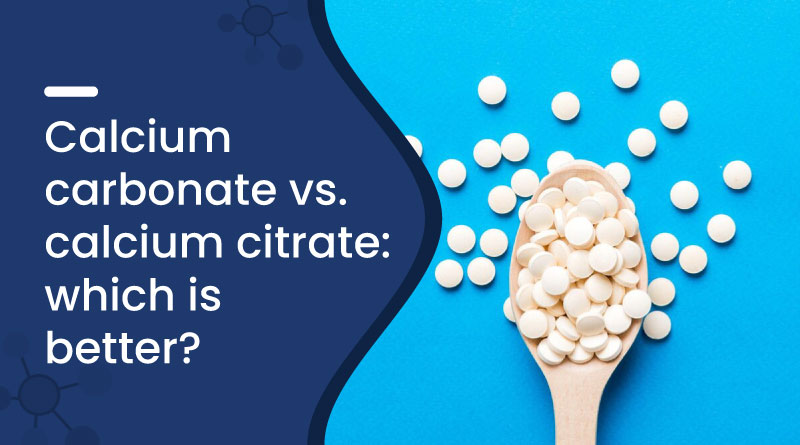Calcium Carbonate vs. Calcium Citrate: Which is Better?


Calcium is a vital mineral for strong bones, teeth, and overall health. Many people take calcium supplements, especially those at risk of osteoporosis or calcium deficiency. However, when choosing a calcium supplement, people often get confused between two popular types: calcium carbonate vs. calcium citrate. In this article, we’ll compare the two, help you understand their differences, and guide you in choosing the right one for your needs.
What is Calcium Carbonate?
Calcium carbonate is a common calcium supplement that contains a high amount of elemental calcium—about 40%. It is usually derived from limestone or oyster shells. Calcium carbonate is most effective when taken with food because stomach acid helps absorb it better.
What is Calcium Citrate?
Calcium citrate is another form of calcium supplement. It contains about 21% elemental calcium, but it is more easily absorbed by the body. Unlike calcium carbonate, calcium citrate does not require stomach acid for absorption, making it a good choice for people with low stomach acid or digestive issues.
Calcium Citrate vs. Calcium Carbonate: Key Differences
Here’s a comparison of calcium citrate v calcium carbonate to help you decide which one is better suited for your body.
- Absorption: Calcium citrate is absorbed well with or without food, while calcium carbonate needs to be taken with meals for better absorption.
- Elemental Calcium: Calcium carbonate provides more calcium per pill (40%) compared to calcium citrate (21%).
- Stomach Sensitivity: Calcium citrate is gentler on the stomach and is suitable for people with acid reflux or digestive issues.
- Cost: Calcium carbonate is generally cheaper and more widely available than calcium citrate.
- Pill Size: Calcium citrate pills are often larger and may require more pills to meet daily calcium needs.
Calcium Citrate vs. Calcium Carbonate: Key Differences
| Feature | Calcium Citrate | Calcium Carbonate |
|---|---|---|
| Absorption | Can be taken with or without food; easily absorbed | Needs to be taken with food for better absorption |
| Elemental Calcium | Contains about 21% elemental calcium | Contains about 40% elemental calcium |
| Digestive Tolerance | Gentle on the stomach; ideal for people with low stomach acid | May cause bloating or gas in sensitive individuals |
| Cost | Generally more expensive | More affordable and widely available |
| Pill Size & Frequency | Often larger pills; may need more per day | Fewer pills needed due to higher calcium content |
Who Should Take Calcium Carbonate?
Calcium carbonate is a good option for:
- People with normal digestion and sufficient stomach acid
- Those looking for a cost-effective calcium supplement
- Individuals who can take supplements with meals
Who Should Take Calcium Citrate?
Calcium citrate may be a better choice for:
- Older adults with reduced stomach acid
- People with digestive disorders like IBS, GERD, or bariatric surgery patients
- Those who prefer taking supplements without food
How Much Calcium Do You Need Daily?
The daily calcium requirement varies by age and gender:
- Adults (19-50 years): 1000 mg/day
- Women over 50 and men over 70: 1200 mg/day
Always check the label of your supplement to know how much elemental calcium it provides and adjust your dosage accordingly.
Tips for Taking Calcium Supplements
- Take calcium carbonate with meals for better absorption.
- Split your calcium dose if you need more than 500 mg at once.
- Combine calcium with vitamin D to enhance absorption.
- Avoid taking calcium supplements with iron or zinc at the same time.
- Stay hydrated and maintain a balanced diet along with supplementation.
Also Read - Calcium Tablets For Bones
Which is Better: Calcium Citrate or Calcium Carbonate?
The answer depends on your personal health needs. If you have a sensitive stomach, trouble with digestion, or prefer taking supplements on an empty stomach, calcium citrate may be the better option. However, if you want a more affordable supplement and can take it with meals, calcium carbonate is a strong choice.
Both types are effective when taken correctly. It’s best to consult with your doctor before starting any supplement, especially if you have kidney issues or are taking other medications.
Summary
Understanding the difference between calcium citrate v calcium carbonate can help you choose the right supplement for your lifestyle and health condition. Calcium carbonate is more affordable and offers more elemental calcium per dose but should be taken with food. Calcium citrate is easier to digest and can be taken anytime but may require more pills for the same dose. Always follow your doctor’s advice for dosage and use.
Frquently Asked QUestions
Q: Is calcium citrate better absorbed than calcium carbonate?
A: Yes, calcium citrate is better absorbed by the body, especially for people with low stomach acid or digestive problems.
Q: Can I take calcium supplements on an empty stomach?
A: Calcium citrate can be taken on an empty stomach, but calcium carbonate should be taken with food.
Q: Which is more cost-effective: calcium citrate or calcium carbonate?
A: Calcium carbonate is generally cheaper and more widely available than calcium citrate.
Q: Can I take calcium with other supplements?
A: Avoid taking calcium with iron or zinc supplements at the same time, as they may interfere with each other’s absorption.
Q: How do I know which calcium supplement is right for me?
A: It depends on your age, health conditions, and digestion. Talk to your doctor or pharmacist for personalized advice.
Recent Blogs
Disclaimer : Zeelab Pharmacy provides health information for knowledge only. Do not self-medicate. Always consult a qualified doctor before starting, stopping, or changing any medicine or treatment.
















 Added!
Added!